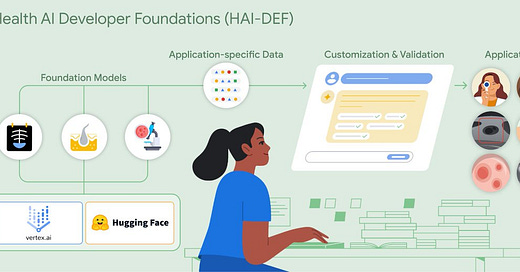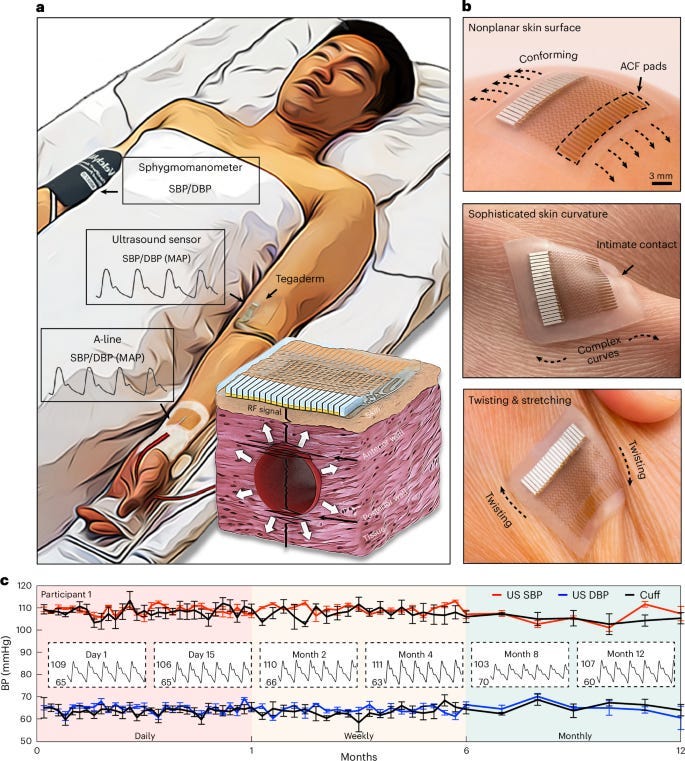TensorHealth-NewsLetter on Medical AI
Exploring the Intersection of Artificial Intelligence and Healthcare Innovation
Opinion AI
How Artificial Intelligence is Transforming Medicine: A Revolution in Healthcare
Artificial intelligence (AI) is ushering in a new era in medicine, one that promises to make healthcare more accurate, efficient, and accessible. While still in its infancy, AI is already demonstrating remarkable potential to improve how physicians diagnose and treat patients. From cancer detection to emergency care and drug discovery, the technology is reshaping the medical landscape in profound ways.
News bits and bytes
Google released a collection of open-weight models for various healthcare applications (dermatology, pathology and chest x-ray assessment, to start with).
EVOLVEpro - Protein Engineering Framework
Directed protein evolution is central to biomedical applications but faces challenges like experimental complexity, inefficient multi-property optimization, and local maxima traps. While in silico methods using protein language models (PLMs) can provide modeled fitness landscape guidance, they struggle to generalize across diverse protein families and map to protein activity. We present EVOLVEpro, a few-shot active learning framework that combines PLMs and regression models to rapidly improve protein activity. EVOLVEpro surpasses current methods, yielding up to 100-fold improvements in desired properties. We demonstrate its effectiveness across six proteins in RNA production, genome editing, and antibody binding applications. These results highlight the advantages of few-shot active learning with minimal experimental data over zero-shot predictions. EVOLVEpro opens new possibilities for AI-guided protein engineering in biology and medicine.
Blood Pressure Monitoring. Wearable ultrasound for continuous blood pressure monitoring.
Pathology
Active learning is a machine learning technique that strategically selects the most informative unlabeled data for human annotation, aiming to maximize model performance while minimizing labeling effort. How can we utilize this technique to better facilitate effective pathologist–AI collaboration in digital pathology?
Image Parsing. Holistic image analysis comprises interdependent subtasks such as segmentation, detection, and recognition of relevant objects. Traditionally, these tasks are tackled separately. In contrast, Image parsing is a unifying framework that jointly pursues these tasks by leveraging their interdependencies such as the semantic label of a segmented object.
Top Medical-AI Papers:
LLM. Backpropagation via text.
Biomedical image analysis is fundamental for biomedical discovery in cell biology, pathology, radiology, and many other biomedical domains. Image analysis comprises interdependent subtasks such as segmentation, detection, and recognition of relevant objects. BiomedParse, a biomedical foundation model for imaging parsing that can jointly conduct segmentation, detection, and recognition for 82 object types across 9 imaging modalities. We leveraged readily available natural-language labels or descriptions accompanying those datasets and use GPT-4 to harmonize the noisy, unstructured text information with established biomedical object ontologies.
LLM Hallucination. Radiology report generation requires vision-language models (VLMs) to identify all diseases or other features of interest in a radiology image and generate a short report. Sometimes VLMs generate hallucinatory statements about prior exams despite not having access to any. How can we reduce VLMs’ hallucinations of prior exams while maintaining the clinical accuracy of the generated reports?
Upcoming Events: [Relevant conferences, webinars, or key dates]
Weekly Exchange Sessions from Stanford University. The talks will be held every week from 1pm-2pm PT on Mondays
SAIL 2025 Call for Abstracts:
The Symposium on Artificial Intelligence for Learning Health Systems (SAIL) is an annual international conference exploring the integration of artificial intelligence (AI) techniques into clinical medicine.
Keep reading with a 7-day free trial
Subscribe to TensorHealth to keep reading this post and get 7 days of free access to the full post archives.






